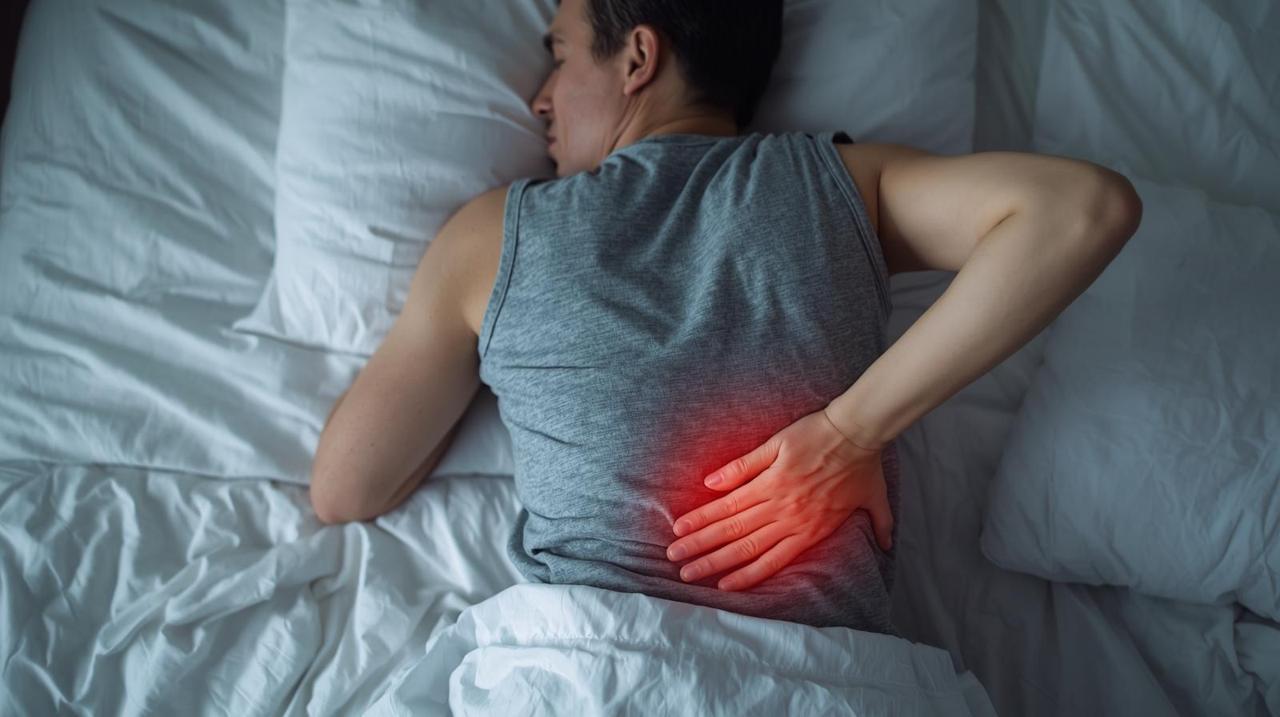
Post by : Sami Jeet
Experiencing back pain every morning is a commonly reported issue, and while it often subsides after a few hours, the consistent appearance of pain indicates a deeper problem. Recognizing the underlying issues behind your morning back pain can assist in addressing the root cause and prevent it from evolving into a chronic condition.
This article explores various reasons for this discomfort and offers actionable solutions.
Morning back pain doesn't occur randomly. When it primarily surfaces upon waking, it typically relates to habits or conditions associated with sleep posture, muscle stiffness, the condition of your mattress, or unrecognized spinal issues. Many individuals overlook these early signals until the pain escalates significantly.
Let’s delve into the specific causes that might be giving your body a heads-up.
One of the most critical, yet often ignored, factors contributing to morning back pain is a worn-out or inappropriate mattress. It's not uncommon for people to use the same mattress for 8 to 10 years without realizing that its supportive qualities diminish over time.
Waking up feeling stiff or sore
Noticing dips or sags in the mattress
Sleeping more comfortably on alternative beds (e.g., hotel mattresses or couches)
Unusual tossing and turning during the night
If your mattress fails to maintain your spine's natural alignment, your back muscles will spend the night compensating, leading to morning stiffness.
A mattress providing medium-firm support is generally beneficial, as it helps keep the spine neutral without unduly stressing the hips or shoulders. Memory foam and orthopedic options can also alleviate pressure while offering sufficient support.
The position in which you sleep contributes to how your spine and muscles recover over the course of 7 to 9 hours. Even slight misalignments can lead to morning stiffness, muscle strain, or joint discomfort.
Sleeping on your stomach (forcefully bending the spine)
Curling tightly in a fetal position (which rounds the spine)
Sleeping in a twisted position
Such sleeping positions place undue stress on the lower back and neck, making you feel “locked” or stiff upon waking.
On your back with a pillow beneath your knees
On your side with a pillow among your legs
Keep your spine straight while flipping sides
Modest adjustments to your sleeping posture can significantly diminish morning back pain within a few weeks.
Remaining stationary for extended periods leads to a reduction in your body's mobility, enabling inflammation to build up within the joints, especially if you suffer from mild arthritis, past injuries, or muscle tightness.
This is why the pain felt in the morning often starts off sharply but improves as you begin moving.
Engage in gentle stretching before sleep
Apply heat to your lower back
Stay well-hydrated
Minimize intake of processed foods and excess sugar
Individuals with undiagnosed inflammatory ailments may experience morning discomfort more often, warranting a medical evaluation if symptoms persist.
The stability of your spine is directly influenced by the strength of your abdominal and lower back muscles. As these muscles weaken, your lower back compensates, particularly during lengthy periods of sleep.
This can lead to morning stiffness, soreness, and intermittent sharp pain.
Pelvic tilts
Cat-cow stretches
Glute bridges
Light yoga
Regular walking
Enhancing core strength is among the most effective long-term remedies for morning back pain.
While many individuals focus on their mattresses, they often overlook their pillows. An improperly heighted pillow may misalign your neck, resulting in strain that radiates down your back.
Morning neck stiffness
Experiencing discomfort in the shoulders
Feeling tingling sensations
Frequent headaches
Your pillow should maintain appropriate alignment between your head and spine — not elevating it too high or leaving it too low.
Stress not only affects your mind but also impacts your muscles. During times of stress, your muscles tend to tighten subconsciously, particularly around the shoulders and lower back. These tense muscles become even more stiff following an extended night of sleep.
Heightens night-time muscle tension
Leads to shallow breathing
Impairs blood circulation
Interrupts restorative deep sleep
Incorporating relaxation practices such as deep breathing, warm baths, or mindfulness techniques before bedtime can help release muscle tension prior to sleep.
Insufficient hydration could affect the soft discs situated between your vertebrae. When your body lacks adequate fluids, these discs lose their cushioning properties, contributing to stiffness in your spine as morning approaches.
Dry mouth
Feeling fatigued
Headaches
Dull back pain upon waking
Ensuring adequate water intake throughout the day supports disc health and diminishes morning stiffness.
Although lifestyle has a significant impact, morning back pain can sometimes indicate a more serious medical condition.
Herniated disc
Sciatica
Spinal degeneration
Arthritis
Fibromyalgia
Kidney issues
If you experience persistent discomfort, numbness, sharp shooting pains, or pain lasting more than 3–4 weeks, it’s crucial to consult a healthcare professional.
Here’s how you can immediately improve your situation:
Invest in a quality mattress
Change pillows every 12 to 18 months
Stretch for 3 to 5 minutes following waking
Avoid prolonged sitting
Avoid slouching
Employ a lumbar support when sitting
Engage in gentle exercises regularly
Incorporate more walking
Stay hydrated
Limit refined sugars
Maintain a healthy weight
By consistently adopting these straightforward steps, you can substantially decrease morning discomfort.
Medical attention is necessary if you experience:
Pain radiating to the legs
Numbness or tingling sensations
Pain persisting beyond a month
Weakness in limbs
Worsening pain despite lifestyle changes
Early diagnosis is essential for preventing lasting damage.
This article is for informational and educational purposes only and should not replace professional health advice. Consult a qualified healthcare professional if you encounter ongoing, severe, or escalating back pain, especially with symptoms such as numbness, fever, or restricted mobility.










Ruben Amorim Addresses Transfer Interests of Mainoo and Zirkzee
Man United's Amorim prioritizes club needs while acknowledging Mainoo and Zirkzee's quest for more p

Real Madrid Salvages 2-2 Draw at Elche with Bellingham’s Late Equalizer
Real Madrid's Jude Bellingham nets a late equalizer as they draw 2-2 with Elche, extending their win

Aston Villa Triumphs Over Leeds with Rogers’ Two Goals
Aston Villa secured a 2-1 victory against Leeds, with Morgan Rogers scoring twice, boosting Villa in

AC Milan Triumphs Over Inter 1-0 Thanks to Pulisic and Maignan
AC Milan's Christian Pulisic scored a crucial goal, while Mike Maignan's penalty save secured a 1-0

Ronaldo's Stunning Bicycle Kick Secures Win for Al-Nassr
At 40, Ronaldo dazzles with a bicycle kick in Al-Nassr's 4-1 victory over Al Khaleej, showcasing his

Englands Rising Stars to Face PM's XI in Canberra
Jacob Bethell, Matthew Potts, and Josh Tongue join the England Lions for a key day-night warmup agai